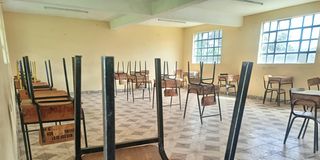Debate on gangs in Nakuru schools escalates as education officials vow to act

An empty form one class room at Kivumbini secondary school during the reporting day on January 16, 2024.
Last week during a press briefing at the Rift Valley Regional Commissioners office, the Cabinet Secretary of Interior Kipchumba Murkomen raised concerns of how gang culture has made its way into the confines of the classroom.
So bad is the situation, that parents are not taking their children to school for fear of being inducted into gangs.
In the course of the past two years, Mtaa Wangu has shed a light on the issue of gang violence in schools.
Highlighting issues of drug peddling in school, the hierarchical structure of gangs within the school set up and the decreased enrolment in some schools within these informal settlements.
In a phone interview with the County Director of Education, Victoria Mulili, she says that it is very important to take note of what the Cabinet Secretary for Interior said with regards to the issue.
“The CS sits at a higher position than me and therefore when he speaks of such cases within our schools it is something that we must look into and look to resolve,” she says.
During the interview, we brought up the issue of Kivumbini Secondary School that we have highlighted time and again as one of the schools that has seen a decrease in enrolments.
“We cannot entirely rule out the issue of gang influence in schools within the informal settlements seeing that even outside school criminal gang elements are present. But we have schools like Langa Langa Secondary, Menengai High School and Afraha Secondary which have a steady enrolment of students,” MS Mulili adds.
However, Ms Mulili says the low turn cannot be fully attributed to gags. In some cases, it is the poor performance of the school that makes parents shy away from it.
She concluded by saying that, with the support of the County Commissioner’s office and security teams, the matter will be thoroughly reviewed once schools reopen in September, and appropriate measures will be put in place to address it.
John Mwangi, a security expert says that gangs usually have a deep root in the informal settlements as to be able to maintain their relevance, they often have to recruit more young members.
“Therefore, schools are usually the main target for these criminal gangs and when you take into consideration that most of those who attend these schools are from humble backgrounds then the promise of money and even status among their peers is something that attracts them to this,” he explains.
Mwangi says that once they lure them, they use them to recruit others within the school, all the while engaging in vices such as selling drugs as a means for them to make money and look “cool” among their peers.
“Those in high school are adolescents and at this age, peer pressure is such a huge influence and a sense of belonging and identity is so important to them so wanting to identify with a curtain group is paramount and that is why you find those students in these school joining the likes of WaTZ, Mauki and such other gangs,” he notes.

